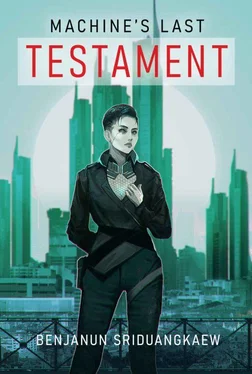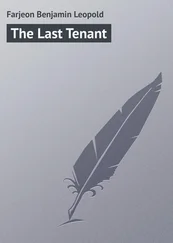She finds Ovuha in the courtyard with the other residents. Most cluster together for comfort or shared resignation, standing guard over their belongings. Clothes, hard currency, first-aid kits. Jewelry and data cubes in clutched hands, the few pieces that have survived camp confiscation. Ovuha alone is without possessions, other than the portable strapped to her wrist.
“The fire started in my room,” Ovuha says calmly. “I must apologize—I wasn’t able to save the clothes you bought for me.”
“In your room.” The dying flames and emergency lights carve up Ovuha’s face, giving it the look of cracked sculpture. Suzhen calls up diagnostics. First-degree burns along one arm. “How did it happen?” Her first thought veers inevitably to self-harm. The sudden guttering of will that can happen to anyone, any time, striking hard and fast as fire on human dermis. A cigarette burn here, a heated razor there. But the diagnostics reports that the injuries are fresh and the intensity of combustion too great, explosive.
“Someone broke into my room while I was out and took the first-aid kit, among others, anything valuable I’d guess. When I came back, the detonation went off. Timed or motion-triggered, hard to tell.” Ovuha has dressed her arm in layers of gauze and she holds it away from her body. Her gaze is still on what remains of her room: the window is shattered. “According to my neighbors there was a power outage just before; whoever did this made sure the surveillance would be off. The apartment’s security is none too robust against tampering.”
Said as though Ovuha has tried tampering with it herself, but Suzhen lets it lie. “Was it the boy who beat you up?”
“I doubt it. He and his wife lived too close, the explosion or the fire could have reached them. Someone might have believed I hoarded untold wealth in my room. Why the rest of it, I can’t imagine. Perhaps I looked at someone wrong.” But a flicker of expression tells Suzhen that Ovuha has a good idea who the perpetrator is or at least why they blew up her room. “Speaking of which, officer, do you notice you’re the only caseworker here?”
It is not as if Suzhen could have failed to notice. Interior Defense still has not arrived, save for their drones. There are no human personnel on the ground other than herself and she’s a civil servant, not a medic or Interior Defense. Her colleagues—some of whom must have the Jasmine’s residents under their purview—are absent entirely. “They’ll be here momentarily. I was likely the closest.” She rubs at her eyes, exhaustion catching up. Two hours of sleep and she doubts she’s getting any more tonight. Her temples ache. Her eyes hurt and her nose stings with grit and smoke. “You’ll give your statement and then you’re coming with me. I’ve put in a housing request, but the transfer won’t happen until morning, if that.”
“You’re giving me a great deal of time and energy. I’m not sure what to say or do about that.”
She doesn’t answer and waits as Ovuha gives her statement to an Interior Defense drone, murmuring to its flat, featureless mask and staring into its gelatinous eyes. Public-facing drones could have been made in more humanoid image, but the only intelligence permitted anthropomorphic bodies is Samsara itself. The rest inhabit mannequin shells, boxy facades and porcelain carapaces, often insectoid and alien.
Once all residents have been rounded up for questioning—none missing, though a few are injured—and their statements recorded, Suzhen authenticates for custody rights to Ovuha, the way one might for an orphaned child or a pet, though Anatta treats both of those more kindly than it treats potentiates. Fortunately Ovuha is not detained as a suspect; the detonation timestamps itself and lines up with her statement, and though there’s no footage of the saboteur there is footage of her leaving and returning to the complex. There is no record of her acquiring flammable material. From Interior Defense’s perspective, there is still a possibility she set it all up herself, timing her absence, the power outage, and the explosion precisely. But for now, she’s allowed to go.
Ovuha is quiet on the train ride. Under better lighting her burned arm is more obviously raw, swelling up translucent and yellow. Second-degree then.
Suzhen hasn’t brought painkillers or much of anything else. She settles on distraction. “What’s Gurudah like?”
The look Ovuha gives her is edgy, startled. “There is not much to say.” Her voice is slightly strained, her gaze glassy with pain.
“A tidally locked planet. That must be different.”
“The day half too hot, the night half too cold. Neither fit for habitation. We had some agriculture down there, small patches; most of the time we lived in orbit. Gurudah has an atmosphere, though much shredded. There were seas. Superb to look at from afar, if devoid of life. We call the planet that, but the real Gurudah was the orbital; that was where people sank their roots, raised their families.”
She lets Ovuha ramble on about hydroponics and the merit of gourds over root vegetables. From her telling Gurudah sounds sufficient, even comfortable. If she suffered hardship or deprivation in her former life Ovuha glosses over it, for much the same reason Suzhen would have. Making oneself an object of tragedy and pity is easy. Retaining dignity while doing so is not.
Outside Suzhen’s apartment, Ovuha hesitates. “I must be the least hygienic thing to have ever entered your home.”
“I’ve had drunk friends come in and throw up on my sofa. So no. Do you need to be shown how the shower works?”
Ovuha tentatively presses the gauze against her arm, but most of it is sliding off, drenched in lymph. “I shouldn’t think so.”
She makes chilled coffee as she waits. It’s tempting to break out something alcoholic or light a cigarette, but she refrains. Why am I doing this . But she already knows the answer. More than being about Ovuha it is a proof of herself—that she can help even one candidate, lift them out of the muck of mandated misery. On the scale of Anatta at large, it doesn’t mean anything, a single life, a single person. Nevertheless. And of course she chose a candidate with phenomenal odds, she wouldn’t have sponsored the man who broke down in her office, the parents who came here with three children in tow, the starved teenager who could barely speak Putonghua. She selects and she discards; she is culpable. The human condition, like Vipada’s character said.
Ovuha comes out in the robe Suzhen loaned her, another article of Taheen’s largesse. Wasp taffeta, green-black, and a sash made of ceramic satin. On the potentiate it looks good, as good as it might look on a mannequin. The hem comes up slightly short, midway down Ovuha’s long, muscled calves.
“It’s a relief,” Ovuha says as she joins Suzhen at the table. A school of particulate betta glides past her; a handful stay to swim circles, orbiting her. “Just to be genuinely clean again. One never contemplates how hygiene connects to feeling like a person.” She has already administered disinfectant and protean to her arm; the latter is hardening on the burned skin, milky like frosted glass.
Suzhen slides over a glass and pours coffee. “I’ve got painkillers.” Protean numbs the area topically, but not for long.
“No. I’m fine. It’s not that I like pain, but I prefer to keep a lucid head.”
“Stoically bearing agony isn’t necessarily a virtue. Medical care does exist for a reason.” She has her guidance show her an inventory of her pantry. “Something to eat?”
“My thanks. But not at the moment.”
They sit in quiet, sipping from their glasses. Suzhen watches Ovuha take in her apartment, gaze going from the ocean-lamps to the betta, to the neat, clean furniture, the tidy shelves and paneled doors. The width of the rooms, the structured comforts of a class-prime.
Читать дальше












